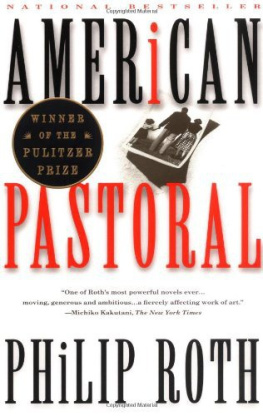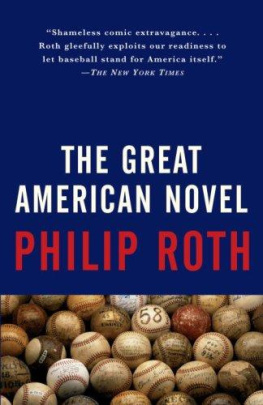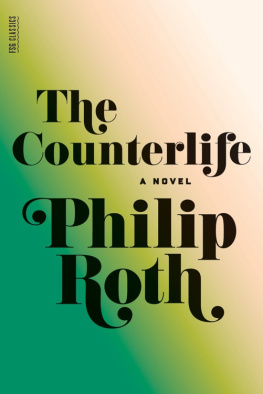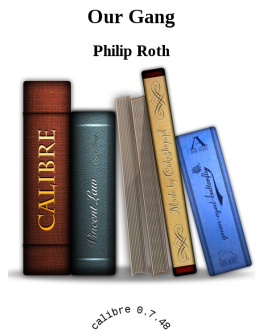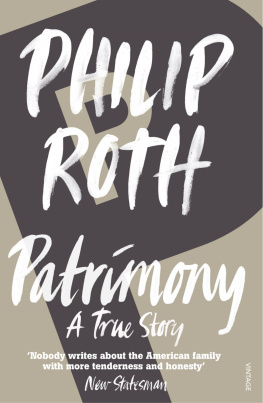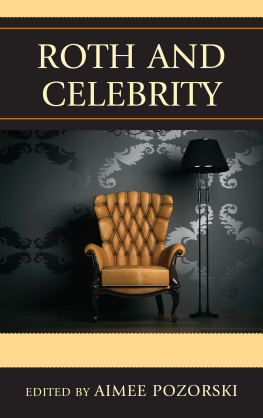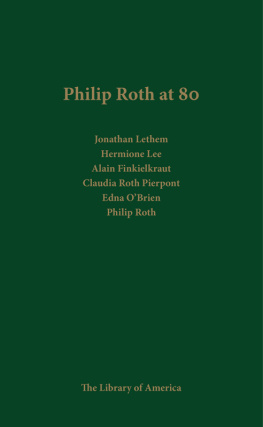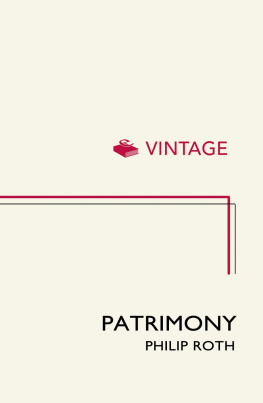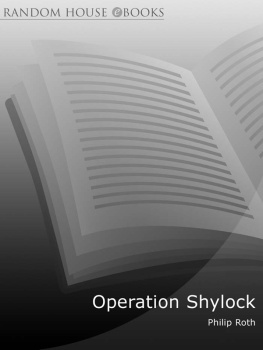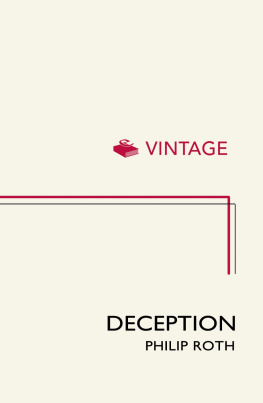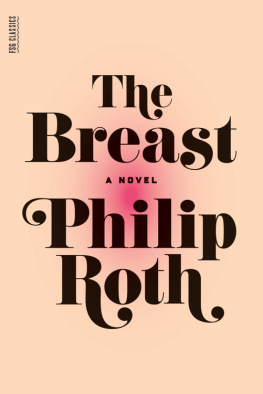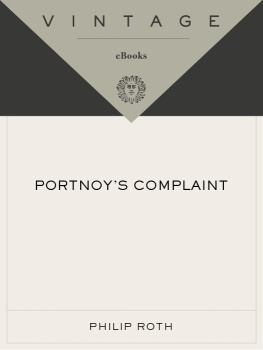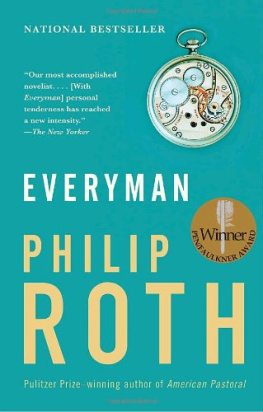Philip Roth - Goodbye Columbus
Here you can read online Philip Roth - Goodbye Columbus full text of the book (entire story) in english for free. Download pdf and epub, get meaning, cover and reviews about this ebook. year: 1989, publisher: Mariner Books, genre: Art. Description of the work, (preface) as well as reviews are available. Best literature library LitArk.com created for fans of good reading and offers a wide selection of genres:
Romance novel
Science fiction
Adventure
Detective
Science
History
Home and family
Prose
Art
Politics
Computer
Non-fiction
Religion
Business
Children
Humor
Choose a favorite category and find really read worthwhile books. Enjoy immersion in the world of imagination, feel the emotions of the characters or learn something new for yourself, make an fascinating discovery.
- Book:Goodbye Columbus
- Author:
- Publisher:Mariner Books
- Genre:
- Year:1989
- Rating:3 / 5
- Favourites:Add to favourites
- Your mark:
- 60
- 1
- 2
- 3
- 4
- 5
Goodbye Columbus: summary, description and annotation
We offer to read an annotation, description, summary or preface (depends on what the author of the book "Goodbye Columbus" wrote himself). If you haven't found the necessary information about the book — write in the comments, we will try to find it.
Goodbye Columbus — read online for free the complete book (whole text) full work
Below is the text of the book, divided by pages. System saving the place of the last page read, allows you to conveniently read the book "Goodbye Columbus" online for free, without having to search again every time where you left off. Put a bookmark, and you can go to the page where you finished reading at any time.
Font size:
Interval:
Bookmark:
HOUGHTON MIFFLIN COMPANY/BOSTON
Copyright 1959 by Philip Roth
Copyright renewed 1987 by Philip Roth
Preface copyright 1989 by Philip Roth
All rights reserved
For information about permission to reproduce selections from
this book, write to Permissions, Houghton Mifflin Company,
2 Park Street, Boston, Massachusetts 02108.
Library of Congress Catalog Card Number: 89-85214
ISBN: 0-395-51850-4
Printed in the United States of America
BTA 10 9 8 7 6 5 4 3 2 1
Goodbye, Columbus, The Conversion of the Jews, and
Epstein appeared in The Paris Review. Defender of the
Faith appeared originally in The New Yorkercopyright
1959 by the New Yorker Magazine, Inc. You Cant Tell a
Man by the Song He Sings and Eli, the Fanatic have appeared
in Commentarycopyright 1957, 1958 by Philip Roth.
To my mother and father
The heart is half a prophet.
Y IDDISH PROVERB
Preface to the Thirtieth Anniversary Edition
xi
Goodbye, Columbus
1
The Conversion of the Jews
137
Defender of the Faith
159
Epstein
201
You Cant Tell a Man by
the Song He Sings
231
Eli, the Fanatic
247
With clarity and with crudeness, and a great deal of exuberance, the embryonic writer who was me wrote these stories in his early twenties, while he was a graduate student at the University of Chicago, a soldier stationed in New Jersey and Washington, D.C., and a novice English instructor back at Chicago following his army discharge. Eisenhower, who was president, the embryonic writer despised, though not nearly as much as he was to despise Eisenhowers Republican successors. His cultural ambitions were formulated in direct opposition to the triumphant, suffocating American philistinism of that time: he despised Time, Life, Hollywood, television, the best-seller list, advertising copy, McCarthyism, Rotary Clubs, racial prejudice, and the American booster mentality. Among the writers he was reading when he wrote these stories in the 1950sand he was reading all the time, all kinds of books, dozens and dozens of themwere David Riesman, Saul Bellow, Bernard Malamud, John Cheever, James Baldwin, Randall Jarrell, Sigmund Freud, Paul Goodman, William Styron, C. Wright Mills, Martin Buber, George Orwell, Suzanne Langer, F. R. Leavis, David Daiches, Edmund Wilson, Alfred Kazin, Ralph Ellison, Erich Fromm, Joseph Conrad, Dylan Thomas, Sean OCasey, e. e. cummingswho collectively represented a republic of discourse in which he aspired to be naturalized.
The magazine to whose strategies of cultural attack and techniques of literary assault he felt an immediate affinity was Philip Rahvs intellectually combative Partisan Review; he bought back issues of the quarterly in the used bookstores around Hyde Park and read each new issue in its entirety the day it appeared in the U. of C. library. The magazine that educated him to be both unapologetic and critically freewheeling about the class of Jews whose customs and beliefs had shaped his boyhood society, the magazine whose example encouraged him to recognize as the seeds of stories the mundane household dramas of his Jewish New Jersey, was the Commentary of the late forties and fifties. Back then Commentary, a monthly supported by the American Jewish Committee, was still a publication in which it was considered not a manifestation of unearned assimilationist superiority or of sick Jewish self-hatred but an expression of ineluctably Jewish self-scrutiny to propose a psychosexual critique of the kosher laws, as Isaac Rosenfield managed to do marvelously in his essay Adam and Eve on Delancey Street, or to reveal, with mournful joy, the raw, hysterical, primitive energies propelling family life in a Brooklyn Jewish neighborhood, as Wallace Markfield did so masterfully in the story The Country of the Crazy Horse.
Of the stories brought together in his own first book, two had previously appeared in Commentary and another in The New Yorker, while the rest (including the longest) had been published in the fledgling quarterly The Paris Review. The sympathetic young editors at The Paris Review were, by and large, from privileged Gentile backgrounds conspicuously unlike those of the Jewish editors encouraging him at Commentary (not to mention his own). The fact that magazines embodying such divergent cultural perspectives could sanction his subject matter had an exhilarating effect on the young writers sense of freedom. In the beginning it simply amazed him that any truly literate audience could seriously be interested in his store of tribal secrets, in what he knew, as a child of his neighborhood, about the rites and taboos of his clanabout their aversions, their aspirations, their fears of deviance and defection, their underlying embarrassments and their ideas of success.
He certainly hadnt imagined, while reading the best of English prose and poetry at college only a few years earlier, that literature of the kind T. S. Eliot praised could be rooted in anything close to him. What did the tiresome tension between parents and children in lower-middle-class Jewish Newarkarguments about shiksas and shrimp cocktail, about going to synagogue and being goodhave to do with Shakespeare and the stoicism of Seneca, or, for that matter, with all the abundance of the unimaginable life to come? Who among the mothers and fathers on his street could speak as fluently as the high school principal, Mr. Herzberg, let alone like Alexander Pope? He saw himself entering into a world of intellectual consequence precisely by moving beyond the unsubtle locutions and coarse simplifications of the families still living where hed grown up, a tiny provincial enclosure where there was no longer room for the likes of him.
And perhaps if hed become something other than a writer, that kind of predictable leave-taking would have been a natural-enough route to maturity. His particular skills, however, inclined him to reimagine as a species of folk fictionas unguarded short stories, spontaneously told, that somehow stretched over the bones of the folktale a skin of satiric social comedywhat not that long before has been the undifferentiated everydayness of Jewish life along the route of Newarks Number 14 Clinton Place bus. In this way, without knowing it, he proceeded to make identical the acts of departure and return and to perpetuate those contradictory yearnings that can perplex the emotions of an ambitious embryothe desire to repudiate and the desire to cling, a sense of allegiance and the need to rebel, the alluring dream of escaping into the challenging unknown and the counterdream of holding fast to the familiar. Altogether unwittingly, he had activated the ambivalence that was to stimulate his imagination for years to come and establish the grounds for that necessary struggle from which hisno, myfiction would spring.
PHILIP ROTH
June 1989
T HE FIRST TIME I saw Brenda she asked me to hold her glasses. Then she stepped out to the edge of the diving board and looked foggily into the pool; it could have been drained, myopic Brenda would never have known it. She dove beautifully, and a moment later she was swimming back to the side of the pool, her head of short-clipped auburn hair held up, straight ahead of her, as though it were a rose on a long stem. She glided to the edge and then was beside me. Thank you, she said, her eyes watery though not from the water. She extended a hand for her glasses but did not put them on until she turned and headed away. I watched her move off. Her hands suddenly appeared behind her. She caught the bottom of her suit between thumb and index finger and flicked what flesh had been showing back where it belonged. My blood jumped.
Font size:
Interval:
Bookmark:
Similar books «Goodbye Columbus»
Look at similar books to Goodbye Columbus. We have selected literature similar in name and meaning in the hope of providing readers with more options to find new, interesting, not yet read works.
Discussion, reviews of the book Goodbye Columbus and just readers' own opinions. Leave your comments, write what you think about the work, its meaning or the main characters. Specify what exactly you liked and what you didn't like, and why you think so.


